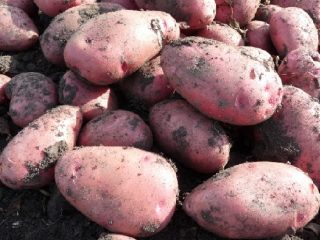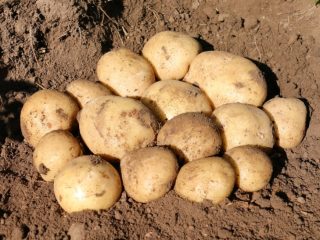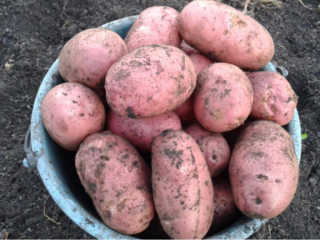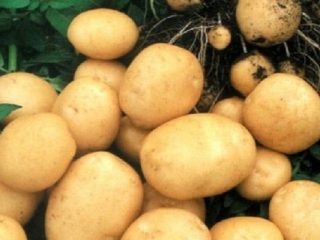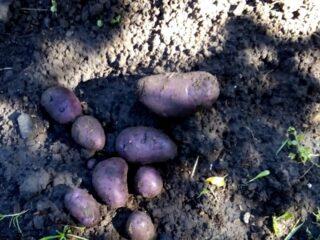Content
Memphis potatoes are a new promising crop variety. It is characterized by good yield and drought resistance, which greatly simplifies care. Therefore, many gardeners have already been able to appreciate it, and, as reviews show, it has many advantages compared to other types of potatoes. In order for a variety to show high productivity regularly, it is necessary to become familiar with the planting features and care rules.
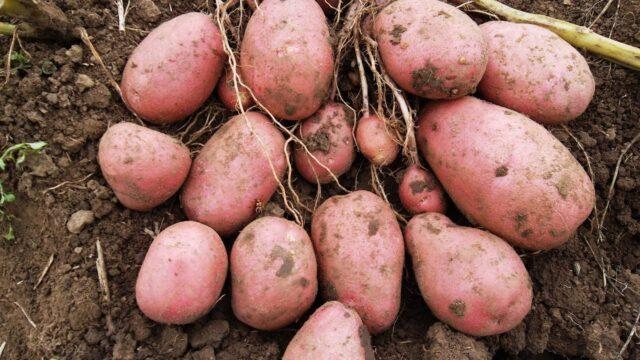
Memphis is a culinary type AB
History of appearance
The originator of Memphis potatoes is the Dutch company IPR B.V. It is unknown which species served as the basis for it. The goal of the creation was to obtain a variety that is able to maintain productivity even with a lack of moisture. And judging by the characteristics of Memphis, the creators completely succeeded.
An application for inclusion of the variety in the State Register of Russia was received in 2012. And after successful tests, Memphis was officially registered three years later.
Description of Memphis potato variety with photo
The appearance of the bushes and tubers of this potato is somewhat different from other types of crops. To be able to distinguish between Memphis in the garden and in the vegetable store, you need to become familiar with these features.
Bush
The variety is characterized by medium or tall bushes of intermediate type. The shoots are strong, thickened, semi-erect. Each bush produces 4-5 stems. The leaves are large, closed to intermediate, with slight wavy edges. The shade of the plates is bright or dark green, the veins on them are weakly expressed. Leaves mostly grow in the upper part of the shoots.
Memphis flowers are purple-pink. The corollas are up to 1 cm in diameter, the anthocyanin inside them is insignificant. Memphis inflorescences consist of 4-5 buds.
The root system of this potato variety is well developed. It consists of many growth and stolon processes. 9-11 tubers are formed under each bush. The yield of small specimens is small.
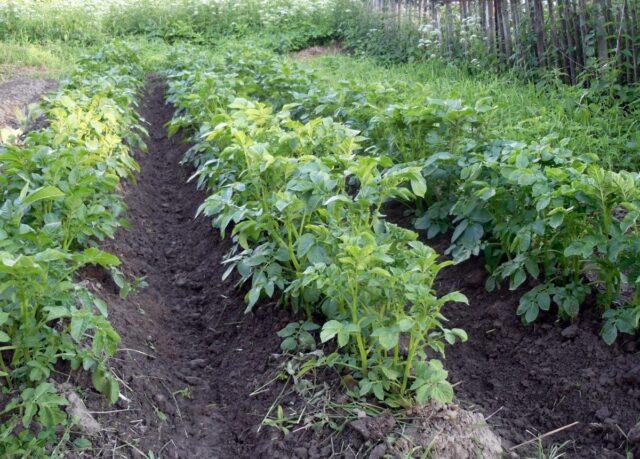
Memphis is a table crop.
Tubers
This potato has large, aligned, oval-shaped tubers. The average weight of each varies between 82-160 g. The peel is smooth with superficial, inconspicuous eyes, of a uniform red hue. When the tubers are boiled whole, the color intensity is lost.
The pulp is dense, light cream in color. Retains its color upon contact with air. The starch concentration in potatoes is 14.2-16.7%.
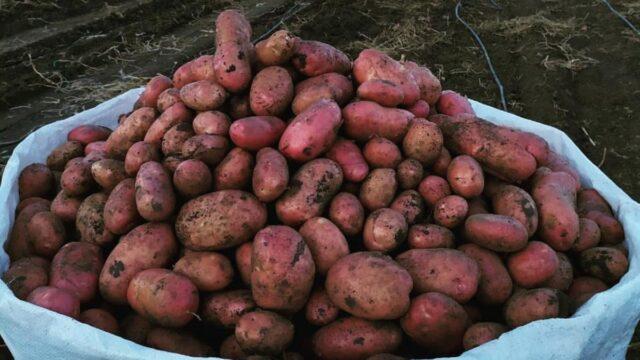
The yield of marketable tubers for the variety is 84-96%
Characteristics of Memphis potatoes
A complete picture of a variety can only be obtained by studying its characteristics. This information will also help you understand what conditions are necessary for maximum yield of a given potato.
Taste qualities of Memphis potatoes
Memphis potatoes have a good taste.Tubers do not become overcooked during heat treatment.
This variety is suitable for:
- salads;
- soups;
- frying;
- boiling in its purified form and “uniform”;
- baking.
Ripening time
This potato variety is mid-early. The duration of its growing season is 80-90 days. Memphis can be grown for an early harvest. In this case, it is recommended to start digging up the bushes 66 days after planting.
Productivity
Memphis potatoes are characterized by good yield. On average it is 180-382 c/ha. The harvested crop is well preserved until the new season.
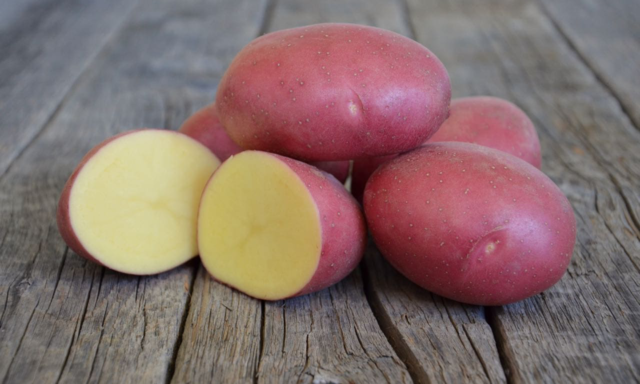
Memphis shelf life level 96%
Where is it grown?
The variety is recommended for cultivation in the Central region of the country. Judging by the reviews of gardeners, it also shows good performance in the southern regions.
Disease resistance
Memphis potatoes are resistant to canker and golden nematode. The likelihood of stems and tubers being affected by late blight is minimal if the care rules are followed. There is no data on the resistance of the variety to common scab, wrinkled, striped mosaics.
Advantages and disadvantages
This variety of crop has many advantages, which are noted by the gardeners who grow it. But this potato also has certain disadvantages that you need to pay attention to so that they do not become an unpleasant surprise later. Berry production is not observed in Memphis.
The main advantages of the variety:
- suitable for early harvest;
- good taste;
- versatility of application;
- excellent commercial quality;
- high level of keeping quality;
- resistance to nematode and cancer;
- increased content of vitamins and minerals;
- drought resistance;
- stable yield.
Flaws:
- needs germination before planting;
- possible late blight;
- demanding of soil nutrition.
How to plant
The area for planting Memphis potatoes needs to be prepared in the fall. It needs to be dug up and humus added at the rate of 10 kg per square meter. m and additionally add superphosphate 30 g, potassium sulfide for the same area size. After this, it is recommended to thoroughly level the surface. The best option for this variety is sandy loam soil with a neutral acidity level. It is possible to plant these potatoes in loamy soil if you first add not only humus, but also 10 kg of sand per square meter. m.
For Memphis, it is recommended to choose a sunny, open area. With a lack of light, the bushes stretch out and the size of the tubers decreases.
To maximize the productivity of this variety, Memphis seeds must be germinated before planting. To do this, bring them into the room three weeks before the procedure, lay them out in one layer and organize a regime of keeping them within +15 °C. Periodically, seed potatoes need to be sprayed with water from a spray bottle and turned over. This promotes uniform development of sprouts. If all conditions are met, their length at the time of planting will reach 1.5 cm, which is the norm.
It is necessary to plant potatoes in holes at a distance of 35 cm. At the same time, maintain a distance of 60 cm between rows. This will allow the bushes to fully develop and not compete for moisture and nutrition.The recommended planting depth for this variety on light soils is 10 cm, and on heavy soils 7 cm.
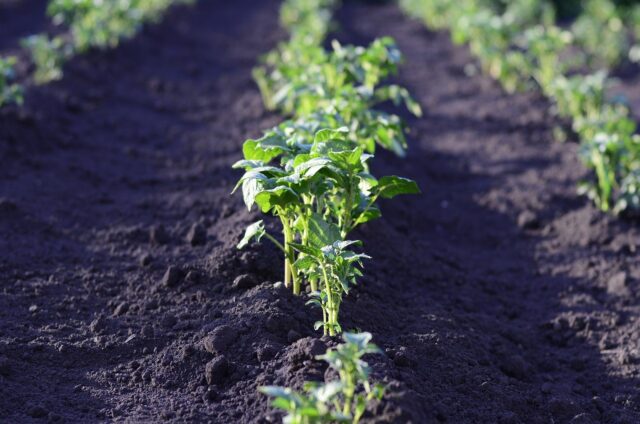
This variety does not develop well in highly acidic soil.
Care instructions
The volume of its harvest depends on the correct care of Memphis plantings. Therefore, you need to strictly adhere to the recommended rules of agricultural technology.
The first thing to do after planting is to loosen the soil to a depth of 1.5 cm ten days later. This prevents the formation of a crust on the soil surface and maintains air access to the seed tubers. In the future, it is recommended to weed as the weeds grow until the Memphis bushes close.
The variety tolerates short-term drought well. It only needs to be watered when there is no rainfall for a long time. Moisturizing is especially important at the stage of bud formation and flowering. It should be carried out in the evening, soaking the soil by 10 cm.
It is recommended to hill up the bushes for the first time when the shoots are 15-18 cm high, and then ten days later.
Memphis potatoes respond well to fertilizing. But they need to be carried out taking into account the stage of development of the bushes. The first time it is necessary to apply fertilizers during the active growth of green mass. During this period, you can use ammonium nitrate at the rate of 30 g per bucket of water or organic matter: chicken manure 1:15 and mullein 1:10. Memphis potatoes need to be fed the second and third times before flowering and after flowering. During these periods, you can use superphosphate 30 g and potassium sulphide 25 g per bucket of water. Under each bush you need to pour 0.5-1 liters of nutrient solution.
Harvest and storage
You can start harvesting Memphis in mid-August. During this period, its shoots begin to sharply turn yellow and wither. It is not recommended to delay collection, as late blight begins to progress during this period.
You need to dig up potatoes in the first half of the day in dry, clear weather. After harvesting, it is recommended to spread the crop on the garden bed and leave it for two hours. After this, it must be moved indoors for further drying.
After a month, sort the collected potatoes and immediately sort them into large, seed and small specimens. After this, the harvest must be brought into the basement. Optimal conditions for long-term storage: temperature +4 °C, air humidity 65-70%.
Conclusion
Memphis potatoes are a new variety that can successfully compete with other types of crops. This is facilitated by its stable yield and good taste. According to the characteristics of the variety, it is characterized by increased drought resistance, so it is suitable for gardeners who cannot provide regular care for the crop.
